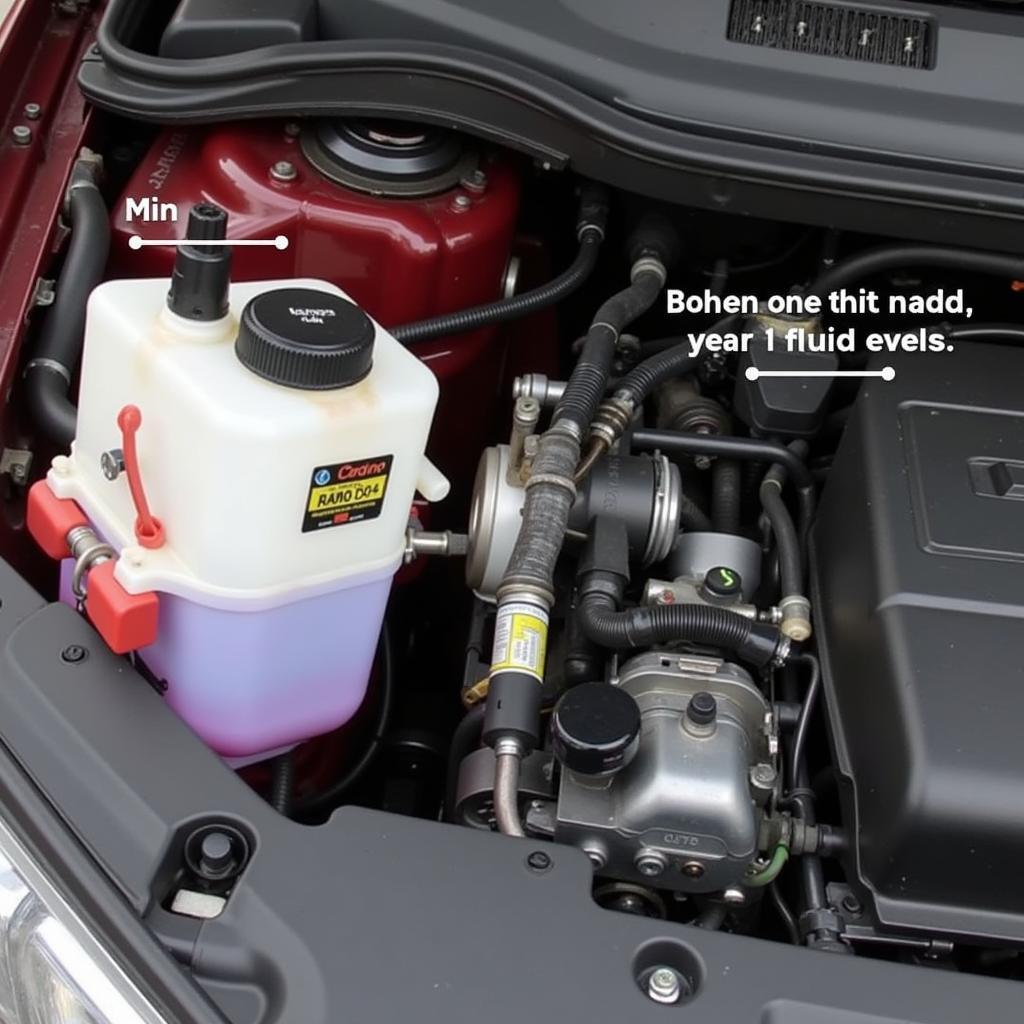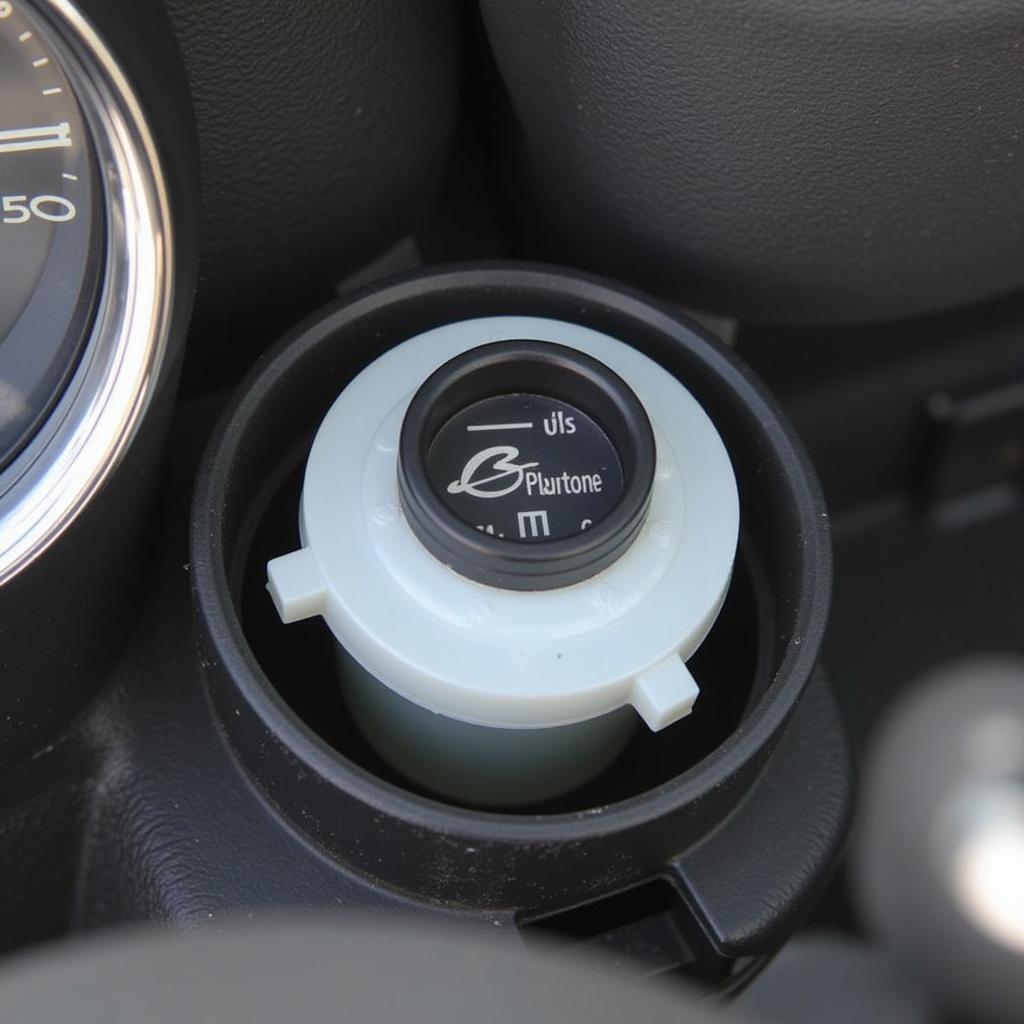Seeing a “low brake fluid” warning light on your Honda Civic’s dashboard can be unsettling. This article will guide you through understanding why this warning appears, the potential risks involved, and how to address the issue safely and effectively, even remotely.
Understanding Your Honda Civic’s Brake System and the Low Fluid Warning
Your Honda Civic’s braking system is crucial for safety. It relies on hydraulic pressure to engage the brakes. Brake fluid transmits this pressure from the pedal to the brake calipers, which squeeze the brake pads against the rotors, stopping the car. When the brake fluid level drops too low, the warning light illuminates, signaling a potential problem that needs immediate attention. Ignoring this warning can lead to brake failure, putting you and others at risk.
Why is My Honda Civic’s Brake Fluid Low?
Several factors can contribute to low brake fluid levels. Normal wear and tear on brake pads can cause the fluid level to decrease gradually. As the pads wear down, the calipers need to extend further to engage the rotors, requiring more brake fluid volume. However, a sudden drop in brake fluid often indicates a leak somewhere in the system. Leaky brake lines, hoses, or a faulty master cylinder are common culprits.
Diagnosing the Problem: Is it a Leak or Wear and Tear?
Determining the cause of low brake fluid requires careful inspection. Start by checking the brake fluid reservoir. It’s usually a translucent plastic container located near the firewall in the engine compartment. The “min” and “max” lines indicate the acceptable fluid range. If the fluid is below the “min” line, you need to add more. However, if you find yourself topping off the fluid frequently, it’s highly likely you have a leak. Look for signs of leakage around the brake lines, hoses, calipers, and the master cylinder. Look for wet spots or stains on the pavement where you park your car.
 Checking the Honda Civic Brake Fluid Reservoir
Checking the Honda Civic Brake Fluid Reservoir
Addressing the Low Brake Fluid Warning
If you suspect a leak, it’s crucial to have a qualified mechanic inspect your brake system immediately. Driving with a brake fluid leak is extremely dangerous. A mechanic can pinpoint the source of the leak and perform the necessary repairs. This might involve replacing brake lines, hoses, or the master cylinder.
If the low fluid level is due to worn brake pads, you’ll need to replace them. It’s a good practice to have your brake system inspected regularly, as part of your routine maintenance, to catch potential problems early on.
Remote Diagnostics and Software Solutions for Honda Civic Brake Issues
Modern technology allows for remote diagnostics and software updates that can address certain brake system issues in your Honda Civic. For example, issues with the ABS (Anti-lock Braking System) or electronic stability control can sometimes be rectified through software updates or recalibrations performed remotely. These advancements offer convenient and efficient solutions without requiring a physical visit to a mechanic. However, these remote solutions are limited and cannot address physical problems like leaks or worn brake pads.
What if I Ignore the Low Brake Fluid Warning?
Ignoring the low brake fluid warning can have severe consequences, including complete brake failure. This can lead to accidents, injuries, or even fatalities. It’s essential to address the warning promptly to ensure your safety and the safety of others.
Conclusion
The “honda civic low brake fluid warning” is a serious indicator that requires immediate attention. By understanding the potential causes and taking appropriate action, you can ensure the safety and reliability of your Honda Civic’s braking system. Don’t delay – address the issue as soon as possible.
FAQ
- How often should I check my Honda Civic’s brake fluid level? Check your brake fluid level at least once a month and before any long trips.
- What type of brake fluid should I use in my Honda Civic? Consult your owner’s manual for the recommended brake fluid type. Using the wrong type can damage your brake system.
- Can I add brake fluid myself? Yes, you can add brake fluid yourself, but be sure to use the correct type and follow the instructions in your owner’s manual.
- Is it safe to drive with the low brake fluid warning light on? No, it is not safe to drive with the low brake fluid warning light on. This indicates a potential problem that needs to be addressed immediately.
- How much does it cost to fix a brake fluid leak? The cost to fix a brake fluid leak varies depending on the source and severity of the leak.
- Can remote diagnostics fix a brake fluid leak? No, remote diagnostics cannot fix a physical problem like a brake fluid leak.
- How can I prevent low brake fluid issues in my Honda Civic? Regular maintenance, including brake inspections and fluid changes, is the best way to prevent low brake fluid issues.


